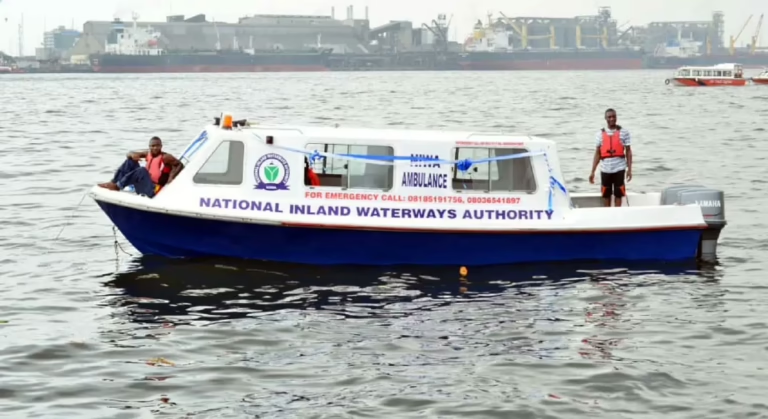The National Inland Waterways Authority (NIWA) declared on Monday that individuals without proper licensing are strictly forbidden from operating vessels on the country’s inland waterways.
During a dedicated press briefing addressing recent boating incidents, NIWA’s Managing Director, Bola Oyebamiji, emphasized that all loading and unloading activities must cease at unauthorized locations nationwide.
Oyebamiji clarified that only officially recognized and registered jetties are permitted for use. Furthermore, commercial operators are required to supply lifejackets to all passengers, and every vessel must prominently display its name along with the designated load line.
Announcing a series of enhanced safety protocols and enforcement strategies, Oyebamiji reaffirmed NIWA’s commitment to safeguarding lives and elevating safety standards within Nigeria’s marine transport sector.
Since the current leadership took office in October 2023, following President Bola Tinubu’s appointment, NIWA has rolled out comprehensive reforms aimed at minimizing accidents on inland waterways.
Within the first half-year of this administration, the long-anticipated Water Transportation Code was officially published and launched, establishing clear regulations for operators, passengers, and all waterway users.
During the same timeframe, NIWA introduced fifteen new operational assets, including patrol vessels, water ambulances, survey boats, and passenger ferries. Additionally, new infrastructure such as the NIWA Clinic and an administrative complex at the Lokoja headquarters were commissioned to boost operational efficiency. To ensure compliance, the number of Water Marshals has expanded from an initial 80 to 350 personnel deployed nationwide.
Passenger protection has been strengthened through the implementation of a manifest system at authorized jetties, enhancing record accuracy. Water Marshals rigorously enforce the “No Lifejacket, No Boarding” policy. Reactivated Search and Rescue Stations have cut emergency response times to under 30 minutes. Safety awareness initiatives have reached over 300 communities in 2025 alone, supported by periodic campaigns in local dialects via radio, TV, print, and digital media.
On the technical front, NIWA has intensified efforts to maintain navigable channels. Marine navigation buoys have been installed along both the Lower and Upper Niger Rivers. Comprehensive hydrographic surveys and profiling covering 624 kilometers from Warri to Baro Port have been completed. The Authority continues to clear waterways of debris, including aquatic waste, logs, and wreckage, to facilitate safer passage.
Collaboration with state governments has been reinforced. In October 2024, NIWA hosted a stakeholders’ forum in Abuja with state transportation commissioners and maritime experts to discuss strategies for eradicating boat accidents. The resulting communique outlined shared responsibilities between federal and state authorities. Some states have already begun fulfilling these commitments by supplying ferries and lifejackets to their residents, with Niger State highlighted as a leading example.
Oyebamiji praised the steadfast support of the Honourable Minister of Marine and Blue Economy, Dr. Adegboyega Oyetola. Over the past four months, the Ministry has facilitated the distribution of more than 45,000 certified lifejackets across twelve states and spearheaded safety campaigns at the state level in Niger and Bayelsa.
Looking forward, NIWA plans to deepen partnerships with the Marine Police and Nigerian Navy, particularly to enforce prohibitions on overloading, restrict night navigation between 6 pm and 6 am, and mandate lifejacket use. Oyebamiji revealed that these initiatives have already led to a reduction in accidents and fatalities by over 70% compared to previous years, though he stressed that further progress is necessary. He reiterated the call for establishing Coastal Guards dedicated to inland waterways, describing this as a vital enforcement mechanism to bolster NIWA’s safety efforts.
As an immediate directive, NIWA has imposed a total ban on loading activities at unauthorized locations, insisting that only registered and approved jetties be utilized. Commercial operators must provide lifejackets for all passengers, and vessels are required to display their names and load lines clearly. Unlicensed boats and operators will be removed from the waterways, and unlicensed personnel are barred from conducting any operations. The Authority also urged riverine states to collaborate in safety campaigns, operator training, lifejacket procurement and distribution, construction of landing platforms, and deployment of modern ferry services.
In conclusion, Oyebamiji underscored that ensuring the safety of Nigerians on inland waterways is a collective national responsibility. “Thanks to our innovative approaches and renewed dedication, we have cut waterway accidents and fatalities by more than 70%. However, there is still more to be done. The establishment of Coastal Guards and enhanced cooperation with states and security agencies will be crucial to achieving a waterway system free of accidents,” he affirmed.



















